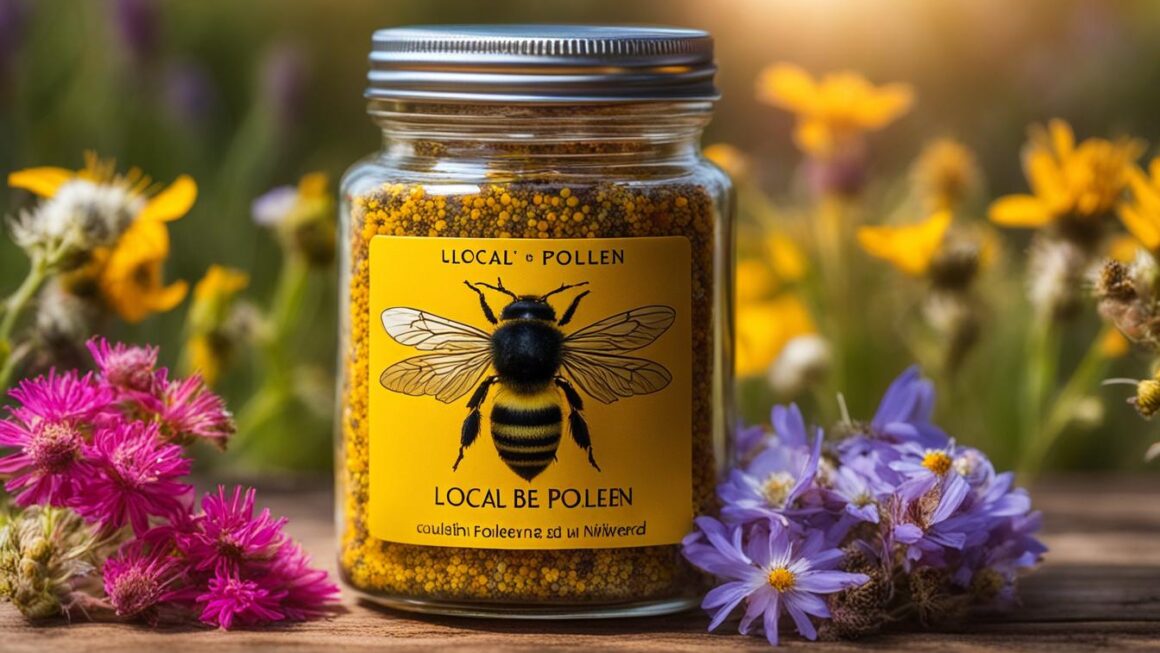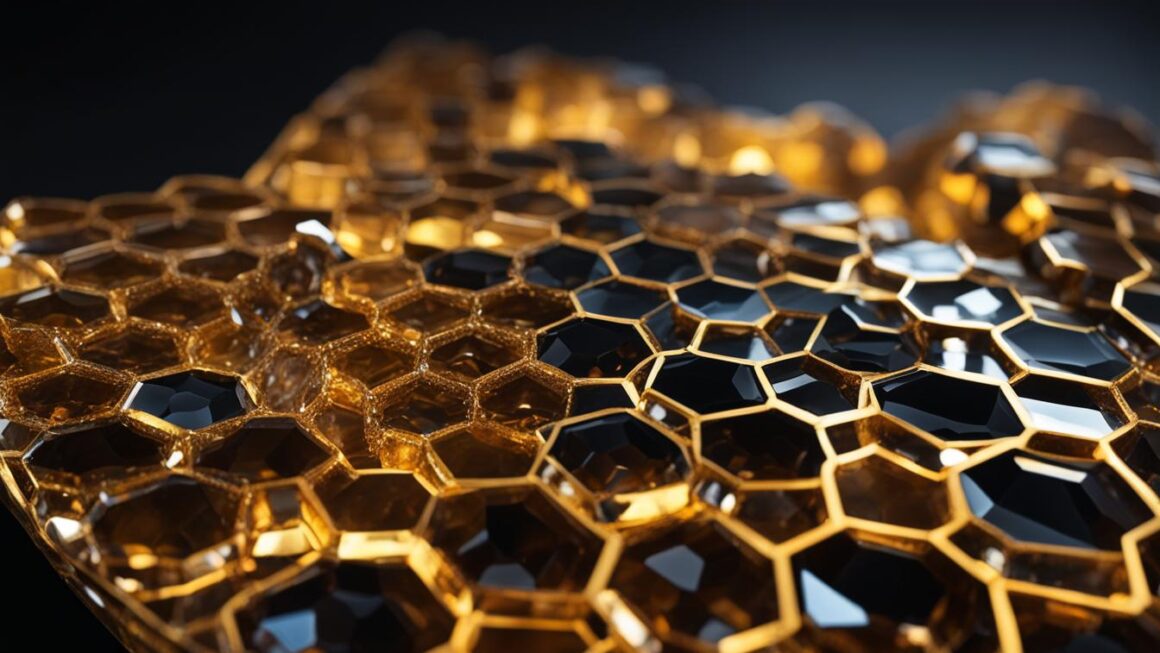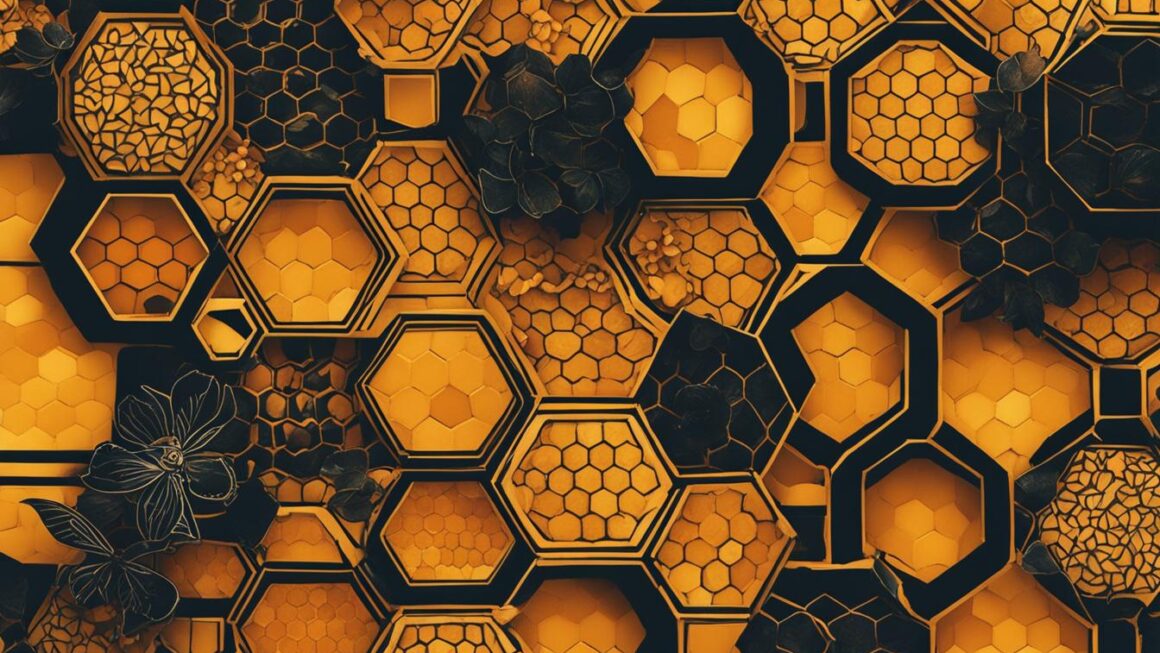Bee pollen is a natural superfood that offers a wide range of potential health benefits. It is rich in vitamins, minerals, proteins, carbohydrates, antioxidants, and other biologically active substances. Derived from a mixture of flower pollen, nectar, enzymes, honey, wax, and bee secretions, bee pollen contains over 250 biologically active substances that can positively impact your well-being.
One of the key advantages of local bee pollen is its freshness and proximity to your area. By consuming local bee pollen, you support your immune system with the specific pollen found in your environment, potentially reducing allergic reactions and boosting overall health.
From promoting heart health to boosting the immune system and aiding in wound healing, bee pollen has shown promise in many areas. However, it is important to note that individuals who are allergic to bees should avoid consuming bee pollen.
Key Takeaways:
- Local bee pollen offers unique benefits due to its proximity and freshness.
- Consuming bee pollen can provide a wide range of essential nutrients and antioxidants.
- Bee pollen may help lower heart disease risk factors and protect the liver.
- It has anti-inflammatory, immune-boosting, and potential anticancer properties.
- Consult with a healthcare professional before incorporating bee pollen into your diet.
What is Bee Pollen?
Bee pollen is a natural substance that is collected by honey bees as they forage from flower to flower. It is a mixture of flower pollen, nectar, enzymes, honey, wax, and bee secretions. Bee pollen should not be confused with other bee products such as honey, royal jelly, or honeycomb, as these may not contain pollen or may contain other substances. Bee pollen is known for its impressive nutritional profile, containing over 250 active substances, including proteins, carbs, lipids, fatty acids, vitamins, minerals, enzymes, and antioxidants.
Bee pollen is a natural superfood that offers a wide range of potential health benefits. It is rich in vitamins, minerals, proteins, carbohydrates, antioxidants, and other biologically active substances. From promoting heart health to boosting the immune system and aiding in wound healing, bee pollen has shown promise in many areas. However, more research is needed to fully understand its effects on specific health conditions and establish recommended usage guidelines. If you are considering using bee pollen, it is important to consult with a healthcare professional to ensure its safety and appropriateness for your individual needs.
Bee pollen is a natural superfood that offers a wide range of potential health benefits.
When discussing the composition of bee pollen, it is important to note that its exact nutrient composition can vary depending on the plant source and the season it is collected. For example, bee pollen collected from pine plants has approximately 7% protein, while pollen collected from date palm contains closer to 35% protein. Additionally, the amino acid composition of bee pollen also varies depending on the season of collection.
In summary, bee pollen is a natural substance collected by honey bees from flowers. It is a potent source of nutrients, including proteins, carbohydrates, lipids, vitamins, minerals, and antioxidants. While its exact composition may vary, bee pollen has the potential to offer numerous health benefits. However, further research is needed to fully understand its effects and establish specific recommendations for its use.
Nutritional Composition of Bee Pollen
Bee pollen is a powerhouse of nutrients, offering a wide range of essential compounds that contribute to its potential health benefits. Its nutritional profile includes proteins, carbs, lipids, fatty acids, vitamins, minerals, enzymes, and antioxidants, making it a highly valuable natural superfood.
On average, bee pollen contains approximately 40% carbs, 35% proteins, 4-10% water, 5% fats, and 5-15% other substances, such as vitamins, minerals, antibiotics, and antioxidants. However, the specific nutrient composition may vary depending on the plant source and the season in which it is collected.
To illustrate the variability, let’s take a closer look at the protein content. Bee pollen collected from pine plants typically contains around 7% protein, while pollen collected from date palm can pack up to 35% protein. This difference highlights the importance of considering the plant source when analyzing the nutritional composition of bee pollen.
| Nutrient | Composition |
|---|---|
| Carbohydrates | Approximately 40% |
| Proteins | Approximately 35% |
| Water | 4-10% |
| Fats | 5% |
| Other Substances (Vitamins, minerals, antibiotics, antioxidants, etc.) | 5-15% |
The nutritional composition of bee pollen also extends to its amino acid profile. However, the specific amino acids present can vary depending on the season in which the pollen is collected. This variation further emphasizes the need for further research to fully understand the intricate composition and potential health benefits associated with different sources of bee pollen.
Antioxidant Properties of Bee Pollen
Bee pollen is renowned for its impressive antioxidant content, making it a powerful contributor to optimal health. Antioxidants are substances that protect the body against free radicals, which can cause damage to cells and increase the risk of chronic diseases like cancer and diabetes. Bee pollen contains a variety of antioxidants, including flavonoids, carotenoids, quercetin, kaempferol, and agglutination.
Flavonoids, such as quercetin and kaempferol, are known for their potent antioxidant effects. These compounds neutralize harmful free radicals and reduce inflammation in the body. Carotenoids, on the other hand, provide bee pollen with its vibrant colors and also act as antioxidants. The specific combination of antioxidants in bee pollen may vary depending on the plant source.
“Bee pollen’s antioxidant properties have been shown to reduce chronic inflammation, fight infections, and inhibit tumor growth in test-tube, animal, and some human studies. These findings highlight its potential as a natural health-promoting substance.”
Research suggests that bee pollen’s antioxidant properties extend beyond fighting free radicals. It has been found to have antimicrobial effects, eliminating harmful bacteria like E. coli and Salmonella. These properties make bee pollen a valuable addition to a healthy diet, supporting overall wellness and potentially reducing the risk of certain diseases.
| Antioxidant | Function | Food Sources |
|---|---|---|
| Flavonoids | Neutralize free radicals, reduce inflammation | Citrus fruits, berries, onions, tea |
| Carotenoids | Protect against oxidative damage | Orange and yellow fruits, leafy greens, carrots |
| Quercetin | Anti-inflammatory, immune-boosting | Apples, onions, berries, tea |
| Kaempferol | Antioxidant, anti-inflammatory | Kale, broccoli, berries, tea |
| Agglutination | Supports immune system function | Bee pollen, other bee products |
While the antioxidant content of bee pollen is scientifically supported, it is important to note that individual results may vary. The effectiveness of bee pollen in delivering antioxidant benefits may depend on factors such as the plant source, the processing methods, and even an individual’s unique biology. It is always advisable to consult a healthcare professional before adding bee pollen or any other supplement to your routine.
Heart Health Benefits of Bee Pollen
| Risk Factors | Benefits of Bee Pollen |
|---|---|
| High blood lipids | Bee pollen extracts have shown potential in lowering blood cholesterol levels, particularly LDL cholesterol, which is considered the “bad” cholesterol. This can help reduce the risk of heart disease. |
| Lipid oxidation | The antioxidants found in bee pollen can protect lipids from oxidizing, preventing the formation of plaques in blood vessels and reducing the risk of heart disease. |
Bee pollen has been studied for its potential heart health benefits, particularly in reducing heart disease risk factors such as high blood lipids and cholesterol. Animal studies have shown that bee pollen extracts can lower blood cholesterol levels, specifically LDL cholesterol, which is known to contribute to heart disease. This could be attributed to the presence of antioxidants in bee pollen, which can protect lipids from oxidative damage and reduce the risk of plaque formation in blood vessels.
It is important to note that while these findings are promising, more human studies are needed to establish specific health recommendations regarding bee pollen and heart health. Additionally, bee pollen should not be considered a substitute for established medical treatments for heart disease or high cholesterol levels. It is always advisable to consult with a healthcare professional before incorporating bee pollen or any other dietary supplement into your routine.
Liver Health Benefits of Bee Pollen
Bee pollen has shown potential in boosting liver health and protecting against damage caused by toxic substances. Animal studies suggest that the antioxidants present in bee pollen promote liver healing and may have benefits in treating liver diseases such as hepatitis and non-alcoholic fatty liver disease. However, it is important to note that more high-quality human studies are needed to fully understand the effects of bee pollen on liver health and to establish specific recommendations.
In a study conducted on animals, bee pollen extracts were found to enhance liver function and offer protection against damage caused by toxic substances, including drug overdoses. The antioxidants present in bee pollen play a key role in promoting liver healing and reducing inflammation. These findings suggest that bee pollen may have potential benefits in supporting liver health and function.
While these findings are promising, it is essential to note that more research is required to determine the specific mechanisms by which bee pollen affects the liver and to establish recommended usage guidelines. For individuals considering the use of bee pollen for liver health, it is advisable to consult with a healthcare professional to ensure its safety and appropriateness for their individual needs.
Anti-Inflammatory Effects of Bee Pollen
Bee pollen has been traditionally used to reduce inflammation and swelling. Studies have shown that bee pollen extract can significantly reduce swelling in animal models, with anti-inflammatory effects comparable to nonsteroidal anti-inflammatory drugs. These effects are attributed to the antioxidant quercetin present in bee pollen, which lowers the production of inflammatory omega-6 fatty acids. Additionally, certain plant compounds in bee pollen have been found to suppress the production of inflammatory hormones like tumor necrosis factor.
Quercetin: An Anti-Inflammatory Powerhouse
One of the key components responsible for the anti-inflammatory effects of bee pollen is quercetin. This potent antioxidant has been shown to reduce the production of inflammatory molecules in the body, helping to alleviate swelling and discomfort. Quercetin acts by inhibiting the enzymes responsible for the production of inflammatory prostaglandins and leukotrienes. By doing so, it helps to reduce pain and improve overall comfort. Studies have also suggested that quercetin may have a beneficial effect on conditions such as arthritis and allergies, further supporting its anti-inflammatory properties.
| Anti-Inflammatory Properties of Bee Pollen | Benefits |
|---|---|
| Reduces inflammation and swelling | Alleviates pain and discomfort |
| Supresses the production of inflammatory hormones | Helps manage inflammatory conditions |
| Contains quercetin, a potent antioxidant | Reduces the production of inflammatory molecules |
“The anti-inflammatory effects of bee pollen are quite remarkable. Research has shown that bee pollen extract can rival the effects of conventional anti-inflammatory drugs. This makes it a promising natural alternative for managing inflammation and its associated symptoms.” – Dr. Jane Thompson, Naturopathic Physician
While bee pollen’s anti-inflammatory properties are promising, it is important to note that individual responses may vary. As with any natural remedy, it is advisable to consult with a healthcare professional before incorporating bee pollen into your healthcare routine, especially if you have any underlying health conditions or are taking medications.
Immune-Boosting Effects of Bee Pollen
Bee pollen has been found to have immune-boosting properties, making it a valuable addition to a healthy lifestyle. Studies have shown that bee pollen can help strengthen the immune system and reduce the severity and onset of allergies. One study found that bee pollen can reduce the activation of mast cells, which release chemicals that trigger allergic reactions. By reducing mast cell activation, bee pollen may help alleviate symptoms such as sneezing, itching, and congestion associated with allergies.
Furthermore, bee pollen has strong antimicrobial properties, making it effective against harmful bacteria. Research has shown that bee pollen can kill bacteria like E. coli, Salmonella, and those that cause staph infections. These antimicrobial properties of bee pollen can help prevent illnesses and promote overall health.
Adding bee pollen to your diet can be a natural way to boost your immune system and protect against allergies and infections. However, it is important to note that if you have pollen allergies, you should exercise caution when consuming bee pollen as it may trigger an allergic reaction. It is recommended to consult with a healthcare professional before incorporating bee pollen into your routine.
| Study | Results |
|---|---|
| Study 1 | Bee pollen reduced mast cell activation and allergic symptoms in participants with pollen allergies. |
| Study 2 | Bee pollen exhibited strong antimicrobial effects against various bacteria, including E. coli, Salmonella, and staph. |
| Study 3 | Bee pollen supplementation improved immune function markers in healthy individuals. |
| Study 4 | Bee pollen reduced the severity and frequency of allergies in participants with allergic rhinitis. |
Overall, bee pollen shows promise in boosting the immune system and protecting against allergies and infections. However, more research is needed to fully understand its mechanisms of action and establish specific recommendations for its use. As with any dietary supplement, it is important to consult with a healthcare professional before incorporating bee pollen into your routine.
Wound Healing Benefits of Bee Pollen
Bee pollen’s anti-inflammatory, antioxidant, and antimicrobial properties make it a valuable resource for promoting wound healing. These properties work together to support the body’s natural healing processes and protect against infections, ensuring optimal recovery.
One study found that bee pollen extract effectively treated burn wounds in animal models, accelerating the healing process and reducing the risk of complications. The anti-inflammatory properties of bee pollen help to reduce swelling and inflammation around the wound, while its antioxidant properties protect against free radicals that can impede the healing process.
Bee pollen’s antimicrobial properties are particularly beneficial for wound healing, as they help prevent infections that can delay healing or lead to further complications. By killing harmful bacteria, bee pollen supports a clean and sterile environment for wounds to heal effectively.
Table: Bee Pollen’s Benefits for Wound Healing
| Benefit | Description |
|---|---|
| Anti-inflammatory properties | Reduce swelling and inflammation around the wound, facilitating the healing process. |
| Antioxidant properties | Protect against free radicals that can hinder wound healing. |
| Antimicrobial properties | Kill harmful bacteria to prevent infections and promote a clean healing environment. |
Bee pollen’s anti-inflammatory, antioxidant, and antimicrobial properties make it a valuable resource for promoting wound healing.
While bee pollen can be applied topically to wounds, it’s important to note that individual sensitivities may vary. It’s always advisable to consult with a healthcare professional before using bee pollen for wound healing purposes, especially if you have any known allergies or medical conditions.
Overall, the combination of bee pollen’s anti-inflammatory, antioxidant, and antimicrobial properties makes it a natural and effective option for supporting the healing process and preventing complications during wound healing.
Potential Anticancer Properties of Bee Pollen
Bee pollen has shown promising potential in inhibiting tumor growth and stimulating apoptosis, the programmed death of cancer cells. Test-tube studies have indicated that bee pollen extracts can effectively suppress the development and spread of prostate, colon, and leukemic cancers. These findings suggest that bee pollen may have a role to play in cancer prevention and treatment. However, it is important to note that further research, particularly in human-based studies, is needed to fully understand the extent of bee pollen’s anticancer properties and its potential applications.
The specific mechanisms by which bee pollen exerts its anticancer effects are still being explored. Some types of bee pollen, such as those derived from cistus and white willow, have been found to possess anti-estrogen properties, which could potentially lower the risk of hormone-related cancers like breast, prostate, and uterine cancers. However, more research is required to determine the exact compounds responsible for these effects and to understand their mechanisms of action.
It is worth noting that while these initial findings are promising, they should not be interpreted as definitive evidence of bee pollen’s ability to prevent or treat cancer. Further research is necessary to establish the safety, appropriate dosage, and specific recommendations for using bee pollen in cancer management. Individuals should always consult with a healthcare professional before incorporating bee pollen or any other supplement into their cancer treatment plan.
Bee Pollen and Cancer Research: A Promising Path
“Bee pollen extracts have shown significant potential in inhibiting tumor growth and inducing apoptosis in test-tube studies. However, more research is needed to fully explore these effects and establish their clinical relevance.”
The potential anticancer properties of bee pollen are an exciting area of research. While current studies have shown promising results, it is important to approach the findings with caution and continue to investigate the mechanisms by which bee pollen may exert its effects on cancer cells. Ongoing research may ultimately lead to the development of novel therapeutic strategies for cancer treatment and prevention.
Alleviation of Menopausal Symptoms with Bee Pollen
Menopause is a natural transition in a woman’s life, but it can often come with uncomfortable symptoms such as hot flashes. Fortunately, studies have shown that bee pollen may offer relief from these menopausal symptoms. One study found that the majority of participants experienced improvements in their menopausal symptoms, including a reduction in hot flashes, while taking bee pollen supplementation.
Bee pollen’s potential to alleviate menopausal symptoms extends beyond hot flashes. Participants in the same study also reported better sleep quality, reduced irritability, less joint pain, improved mood and energy, and even improvements in cholesterol levels. These findings suggest that bee pollen may have multiple benefits for women going through menopause.
To fully understand the effectiveness of bee pollen in managing menopausal symptoms, further research is needed. However, these preliminary results are encouraging and highlight the potential of bee pollen as a natural remedy for menopause-related discomfort. If you are experiencing menopausal symptoms, it may be worth considering bee pollen supplementation and consulting with a healthcare professional for personalized advice.
Bee Pollen’s Effect on Nutrient Utilization and Metabolism
Bee pollen has been shown to have potential benefits for nutrient utilization and metabolism. Animal studies have demonstrated that supplementation with bee pollen can enhance the absorption of important nutrients such as iron, calcium, and phosphorus. This may be attributed to the rich nutritional composition of bee pollen, which includes vitamins, minerals, proteins, carbohydrates, and other biologically active substances.
When it comes to metabolism, bee pollen’s nutrient content can support the body’s metabolic processes. The proteins, carbohydrates, and vitamins present in bee pollen provide the necessary fuel and building blocks for various metabolic reactions. Additionally, the antioxidants found in bee pollen can help protect against oxidative stress, which can negatively impact metabolism.
It is important to note that while bee pollen shows promise in improving nutrient utilization and metabolism, more research is needed to fully understand the mechanisms involved and to establish specific recommendations. Additionally, individual responses to bee pollen may vary, and it is always advisable to consult with a healthcare professional before incorporating any new supplements into your routine.
| Nutrient | Benefit |
|---|---|
| Iron | Enhanced absorption, supporting red blood cell production |
| Calcium | Improved bone health and mineralization |
| Phosphorus | Enhanced energy production and cellular function |
| Vitamins | Supports various metabolic reactions and cellular processes |
| Proteins | Provides amino acids for tissue repair and growth |
| Carbohydrates | Serves as an energy source for metabolic functions |
Table: Summary of the nutrient utilization and metabolism benefits provided by bee pollen.
Safety Precautions and Allergies
Bee pollen, while generally safe for most individuals, may cause allergic reactions in those with pollen allergies. It is important to be aware of the potential risks and take necessary precautions before consuming bee pollen.
Allergic reactions to bee pollen can manifest as itching, redness, shortness of breath, hives, swelling, and in severe cases, anaphylaxis. Individuals with known pollen allergies should exercise caution and consult with a healthcare professional before incorporating bee pollen into their diet or routine.
It is also important to note that bee pollen is not recommended for children, pregnant women, or breastfeeding women. If you have any allergies or are taking any medications, it is crucial to seek medical advice before considering bee pollen supplementation.
To ensure your safety and minimize the risk of an allergic reaction, it is recommended to start with a small amount of bee pollen and gradually increase the dosage over time. This allows your body to adapt and reduces the likelihood of an adverse response.
Allergy Testing and Medical Supervision
If you are unsure whether you have a pollen allergy or if you are at a higher risk of allergic reactions, it is advisable to undergo allergy testing. This can help identify specific allergens and determine if bee pollen would pose a risk to your health.
Conclusion
While bee pollen offers a range of potential health benefits, it is essential to prioritize your safety. Always consult with a healthcare professional, especially if you have a history of allergies or are taking any medications. By following the necessary precautions and seeking medical advice, you can make informed decisions about incorporating bee pollen into your wellness routine.

Availability and Uses of Bee Pollen
Bee pollen is readily available at many health food stores and can also be found in other natural dietary supplements. It is a versatile product that is used for various purposes due to its potential health benefits. Some of the common uses of bee pollen include:
- As a dietary supplement: Bee pollen is often consumed as a supplement due to its rich nutritional content. It is believed to provide a wide range of vitamins, minerals, proteins, and antioxidants that can support overall health and well-being.
- In skin products: Bee pollen is also used in skincare products for its potential benefits on the skin. It is believed to have moisturizing and soothing properties, making it suitable for conditions like diaper rash or eczema.
While bee pollen is often recommended for various health conditions, including alcoholism, asthma, allergies, and premenstrual syndrome, it is important to note that there is limited scientific evidence to support its efficacy for these uses. Therefore, it is advisable to consult with a healthcare professional before using bee pollen for any specific health condition.
Overall, bee pollen is a natural product that offers potential health benefits and can be used in various forms. However, it is important to ensure its safety and appropriateness for individual needs by consulting with a healthcare professional.
Conclusion
Bee pollen is a natural superfood that offers a wide range of potential health benefits. It is rich in vitamins, minerals, proteins, carbohydrates, antioxidants, and other biologically active substances. This nutrient-packed substance has shown promise in promoting heart health, boosting the immune system, aiding in wound healing, and more.
However, it’s important to note that more research is needed to fully understand the effects of bee pollen on specific health conditions and establish recommended usage guidelines. If you are considering using bee pollen, it is crucial to consult with a healthcare professional to ensure its safety and appropriateness for your individual needs.
While bee pollen has shown great potential, it is not a magic cure-all. It is always best to approach any dietary supplement with caution and seek professional advice to make informed decisions about your health. With proper guidance, bee pollen can be a valuable addition to a well-rounded approach to nutrition and wellness.
FAQ
What is bee pollen?
Bee pollen is a mixture of flower pollen, nectar, enzymes, honey, wax, and bee secretions that is collected by honey bees as they forage from flower to flower.
What is the nutritional composition of bee pollen?
Bee pollen is rich in proteins, carbohydrates, lipids, vitamins, minerals, enzymes, and antioxidants. It contains approximately 40% carbs, 35% protein, 5% fats, and 5-15% other substances, including vitamins and minerals.
What are the antioxidant properties of bee pollen?
Bee pollen is loaded with antioxidants such as flavonoids, carotenoids, quercetin, kaempferol, and agglutination. These antioxidants protect the body against free radicals and chronic diseases.
How does bee pollen benefit heart health?
Bee pollen may help lower heart disease risk factors such as high blood lipids and cholesterol. It also protects lipids from oxidizing, which can restrict blood vessels and increase the risk of heart disease.
What are the liver health benefits of bee pollen?
Bee pollen promotes liver healing and has potential benefits in treating hepatitis and non-alcoholic fatty liver disease. It protects the liver against damage from toxic substances.
How does bee pollen reduce inflammation?
Bee pollen has anti-inflammatory effects due to the presence of the antioxidant quercetin. It lowers the production of inflammatory omega-6 fatty acids and suppresses the production of inflammatory hormones.
How does bee pollen boost the immune system?
Bee pollen reduces the activation of mast cells, which release chemicals that trigger allergic reactions. It also has strong antimicrobial properties and can kill harmful bacteria.
Can bee pollen aid in wound healing?
Yes, bee pollen has been shown to promote wound healing in animal studies. Its anti-inflammatory, antioxidant, and antimicrobial properties contribute to its effectiveness.
Does bee pollen have potential anticancer properties?
Test-tube studies have shown that bee pollen extracts can inhibit tumor growth and promote apoptosis in certain types of cancer cells. However, more research is needed to fully understand its anticancer properties.
Can bee pollen alleviate menopausal symptoms?
Bee pollen has been reported to improve menopausal symptoms such as hot flashes. It may also lead to better sleep, reduced irritability, less joint pain, improved mood and energy, and improvements in cholesterol levels.
How does bee pollen affect nutrient utilization and metabolism?
Animal studies have shown that bee pollen supplementation can enhance the absorption of iron, calcium, and phosphorus. Its nutrient composition supports nutrient utilization and metabolism.
Is bee pollen safe for everyone to consume?
Bee pollen should not be taken by individuals who are allergic to bees as it may cause allergic reactions. It is recommended to consult with a doctor before taking bee pollen, especially if you have any allergies or are taking any medications.
Where can I find bee pollen?
Bee pollen is available at many health food stores and can be found in natural dietary supplements. It is also used in skin softening products for conditions like baby’s diaper rash or eczema.
What is the conclusion regarding bee pollen?
Bee pollen is a natural superfood that offers a wide range of potential health benefits. It is rich in vitamins, minerals, proteins, carbohydrates, antioxidants, and other biologically active substances. From promoting heart health to boosting the immune system and aiding in wound healing, bee pollen has shown promise in many areas. However, more research is needed to fully understand its effects on specific health conditions and establish recommended usage guidelines. If you are considering using bee pollen, it is important to consult with a healthcare professional to ensure its safety and appropriateness for your individual needs.




